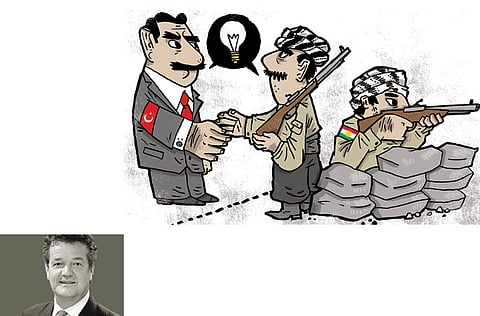Ankara’s new sphere of influence
Turkey has remained publicly committed to Syria’s territorial integrity

A bizarre reconciliation is happening between Turkey and the Kurds. They have fought each other for decades in bitter wars, but now new forces in Iraq and Syria are driving them together. The increasing Shiite sectarianism of Nouri Al Maliki’s government in Iraq and a political recognition that Syria is collapsing with no obvious winners in sight have forced a major shift in Turkish policy.
It is all the more surprising that this is happening just as the Kurdish Regional Government (KRG) of the Kurdish region in northern Iraq is behaving increasingly like the centre of an emerging independent Kurdistan, as it prepares and sends militiamen to fight to defend the Kurds in both Syria and Iran.
Massoud Barzani, President of the KRG, has appealed to young Syrian Kurds to come to the KRG for military training, so that they can play a role in “protecting their native land and maintaining security within it”. Barzani told the Kurdish news agency Peyamner that these semi-military units will defend the interests of the two million Kurds who live in Syria and will “fill the security vacuum” as the Syrian regime collapses.
These Kurdish fighters, trained and supported by the KRG, will be at the disposal of the “Supreme Kurdish Council” which is a body set up under Barzani’s aegis in Erbil last year and includes the Kurdish National Council and the People’s Council of West Kurdistan, which is what political Kurds call the Kurdish areas of Syria around Qamishli. These KRG-backed units are already cooperating in Qamishli with units backed by the Kurdish National Democratic Union, PYD, which is linked to the militant PKK, Kurdish Workers Party.
The phrase “West Kurdistan”, used to describe north-east Syria, should send shivers down the spine of any Turkish prime minister, but Recep Tayyip Erdogan is shivering a lot more at the imminent prospect of Jabhat Al Nusra, the Al Qaida affiliate, controlling a large part of northern Syria, including long stretches of the 900-kilometre border that Syria shares with Turkey.
Turkey is working hard to develop a much more active approach to the emerging new Kurdish powers south of its borders. It has developed a good relationship with the KRG and the Kurds are buying a lot of Turkish goods, while their substantial energy resources are important to Turkey. This warmth is in stark contrast to the deeply suspicious approach of ten years ago when the Turks were worried that the KRG would become a base for the PKK, which has been fighting for autonomy or possible independence for the Kurdish region in Turkey.
More startlingly, Erdogan has held talks with the imprisoned Abdullah Ocalan, the notorious leader of the PKK, and they have come to an agreement to stop the fighting in the 29-year Kurdish insurrection. Ocalan said it was time for “the guns to fall silent and for ideas to speak” and Erdogan called Ocalan’s statement “positive”.
More importantly, Ocalan seem to be obeyed by the militias in the field, as Murat Karayilan, a senior PKK commander in Kurdish-controlled northern Iraq, swiftly declared a ceasefire and the PKK has announced that it will start to withdraw its 3,000 militiamen from Turkish territory into the KRG on May 8.
The Iranians must be profoundly worried by these developments. The PKK has had an offshoot in Iran, the PJAK (Kurdish Free Life Party), which has had a ceasefire with Iran for almost two years, during which time, Iran stopped cooperating with Turkey against Kurdish militants of whatever national origin. Many PKK militiamen from the Iranian struggle moved over to fight against the Turks, but now it seems very possible that this “Iranian faction” of the PKK will return to Iran and seek to take up the struggle against the government once more. This will delight Erdogan and for Barzani, it will simply be a continuation of the Kurds’ decades-long fight anyway.
The new Turkish willingness to be actively involved in events across its southern border is analysed in a report titled ‘Blurring the Borders: Syrian Spillover Risks for Turkey’, by the International Crisis Group, ICG. The report describes how Turkey has stopped planning for a quick resolution of the Syrian crisis and that it needs to build on its successful handling of the refugee crisis to support a negotiated settlement.
“Ankara wants to build a sphere of influence, stability and prosperity in the Muslim countries to its south”, says Hugh Pope, Crisis Group’s Turkey/Cyprus project director. “A well-planned, non-sectarian policy to care for the large refugee population inside Turkey will allow Ankara to lay the foundation for friendly relations with whatever Syria emerges from the conflict”.
Since Turkey has lined up with conservative Sunni partners, such as Qatar and Saudi Arabia, it has remained publicly committed to Syria’s territorial integrity. However, the ICG report describes an undeclared Turkish policy in the Middle East of taking advantage of the expected decentralisation of post-Bashar Al Assad Syria, as Turkey seeks to carve out a cordon sanitaire across its southern border, building influence in the Kurdish populations of Iraq and Syria, with their large commercial centres such as Aleppo and Mosul.
Sign up for the Daily Briefing
Get the latest news and updates straight to your inbox



